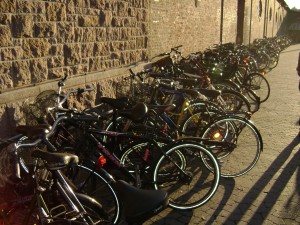Should we as Youth put our trust in those older than us? Do we have a choice?
This is a question that I’ve been inspired to think about during the last few days. The young woman from India who addressed the UN climate chief Yvo de Boer on behalf of the youth yesterday ended her powerful, inspiring speech by imploring negotiators to come to agreement on strong, binding emissions reduction targets. The world is trusting in the negotiators to come to an agreement that might protect our brothers and sisters in low lying island, those in areas threatened by desertification and water scarcity and in general, our future generations. De Boer replied that he was worried she was being too free with her trust. Trust must be earned he said, and by the looks of it, our negotiators have not earned our trust yet. Was that a fair reaction?
Part of me wishes she had straightforwardly said, hey listen I don’t trust you but I deeply respect the power you currently hold and I realize that I am at your mercy…to a certain extent. Personally, I don’t put much trust in these negotiations, and I fear they are far to simplistic to make an powerful difference. We have placed the context of our futures in the hands of world leaders, while at the same time that compressed and condensed the world’ challenges into the package of several small but powerful gases. We are talking about our futures in terms of carbon dioxide and methane gas instead of clean waters and clean air, healthy foods and ecosystems, or vibrant and strong communities. Our problem is not carbon dioxide. Our relationship with the planet and ourselves is the problem. Trying to change industries and reduce emissions is incredibly important, but until we change our desires, our values, the way we interact with one another and the way we inhabit this planet, I have little faith in the ability of our leaders to protect us. We are responsible for protecting each other from the upcoming catastrophes. Being at the COP has impressed upon me just how divided we are about the problem we all agree upon.
Tags: climate change, Danielle Hoffman, developing countries, India, student-citizens
I want to briefly address two things that I came across these few days.
1.
Last week, there was a side event on carbon equity being discussed by scientists from China. In recently years, China has grown to be the largest carbon emitter in the world and it is always been blamed for greatly attributing to climate change. So China is taking a more aggressive approach by proposing cumulative emission per capita should also be included and it should play an essential role. China was saying by using the critiria of emission per capita is for equity and sustainability, and it can urge developed countries to compensate and to make deeper cuts. I personally think emission per capita is a factor to consider but it should not come first, and it is not a very convincing reason for developed countries to make more emission reductions. The idea China proposed does make scientific sense, but it may cause developed countries to think it is unfair for them. Most developing countries have a much bigger population but lower emissions compared with developed countries, so of course, they have a much lower emission per capata. Besides, the study China has carried out during the side event was based on the scenario that China would continue to be a country that highly depended on fossil fuels. However, China has been taking a leader role in developing green and renewable energy and it has gradually gained the ability to reverse the trend, so the question of wheather it is fair for China to ask developed countries to take up more responsibilities is being raised.
2.
I was just listening to a discussion about carbon financing. One guy, who’s a journalist, proposed the idea that private sector should voluntarily contribute to adaptation programs. Adaptation is always been brought up along with mitigation, and sometimes peoeple find it hard to differentiate the two. There exists an inbalance between mitigation and adaptation. Mitigation is effective especially for developed countries because it has the financial capability, but it is not what is most needed for the poor countries. Adapation is usually underrepresented in the negotiation, but it provides equity to poor countries to deal the problems that they did not cause. Of course the world, especially the developing world, would love to see private sector funding adaptation programs, but the premise is the private sector would do so voluntarily. What the motivations could be is an issue to be further examined.
Tags: adaptation, Carbon equity
What does the future of environmental sustainability look like? Having grown up in the city of Los Angeles, I became accustomed to a driving culture where traffic and smog were a way of life. During my teenage years, I had the opportunity to travel to cities in Europe like Paris and Brussels, cities in the South Pacific like Sydney and Auckland, as well as Rio De Janeiro in Brazil. In these cities as well as my trips to the eastern United States, I saw for the first time clean and reliable transportation, which led me to draw the conclusion that as long as public transportation is efficient people will ride.

Clean Public Transportation
Although public transportation is a crucial component to environmental sustainability, in Copenhagen I have discovered an environmental sustainability that far exceeds anything I have ever seen. Firstly, public transportation (as this picture indicates)

Personal Bikes Outside of the Metro Station
is clean and reliable, which encourages the Danish to use it. Beyond that, people in Copenhagen have taken the initiative to buy bicycles and regularly ride them despite weather conditions. This willingness to bicycle miles to work instead of drive or take public transport shows an environmental mindset in the Danish.
Additionally, both restaurants and stores seem to discourage wastefulness. For instance, I have found many restaurants that charge the equivalent of $2 US Dollars for water and $1 US Dollar for a grocery bag at the grocery store. Although these are both small amounts, they have discouraged me from consuming excess items and I’m sure they have had the same effect on others. Despite the fact that I am no expert on Danish policy or Copenhagen, it goes without saying that these efforts are worthy of acknowledgement. It is my hope that people attending the United Nations Climate Change Conference in Copenhagen will notice these efforts and apply them in their native country. Through small steps like these, we can hopefully begin the process of environmental sustainability.
Throughout my time at COP15 and in Copenhagen I’ve been reflecting on what it will take in order to effectively address the issue of climate change. As a policy management major, I tend to view any policy issue in terms of incremental steps. Policy change is slow– and with an international governance system as complex as the UNFCCC — one shouldn’t put all of their eggs in one basket and expect the result of this conference to dramatically shift all crises directly or indirectly related to climate change. Yet this is dire issue. The IPCC estimates that we need to peak CO2 emissions by 2015 which is especially troubling considering the current 2-3% global growth in emissions. So what is the best way to go about tackling this beast of a problem?
For some, the entire system needs to change. At a KlimaForum event titled “Will a Green New Deal Save Us?” representatives from the Attac Germany suggested that capitalism is the heart of the problem and emphasized the need for de-growth (I should point out that KlimaForum is a seperate conference from COP15 and is much more radical). They advocated for a new type of macro economics and a just transformation for climate justice. This sentiment was also felt by many who attended the climate demonstration on Saturday, where there was more than 100,000 participants at the Bella Center and throughout Copenhagen. Nevertheless, many individuals in the audience (including myself) had reservations about the presentation and questioned the viability of re-thinking our entire economic system before taking on more practical and immediate initiatives. One man even went as far as to suggest that the “blah, blah, blah…Act Now” protest signs were more appropriate in criticizing the presentation rather than the official negotiations in which they were originally conceived for. Surely it is important to consider the fundamental elements of any problem. But this revolution of sorts, in addition to lacking sufficient political will, would have many unforeseen and unpredictable consequences.

December 12 Protest at Bella Center
Regrettably, however, I do not feel much progress at the official negotiations either. Partly because as an observer, I do not have much influence over delegates but also due to the size and scope of this conference. At one point or another, everyone in our group has admitted to being overwhelmed at COP15. With 34,000 registered participants, a host of side events, and the official plenary sessions to keep track of one can easily see how so many people are involved in this process and how slow decisions are being developed. It is certainly frustrating at times, but its not like anyone isn’t trying. Something good will come from all of this (in whatever form that might be).
An important lesson I have taken away from all of this is the need to act locally–both within our countries and our own communities. Global action is a slow process (and an important one) but one should never overlook the influence he or she has on a smaller scale. But perhaps what is even more important is the necessity to deal with what you’ve got. Not that revolution is a bad thing. Indeed, one day it might be necessary. Yet the deficiencies that exists in the international system today–and the political and economic systems that have been around for centuries– are perhaps more difficult to fix than the problem of climate change, itself.
Today two members from our group interviewed Sanjay Khanna, a journalist for news outlets such as Huffington Post. This is the second time that I have had a conversation with Sanjay, and both times I have been left in a deep state of thought. Sanjay’s focus is on promoting a message that climate change will “require us to become more psychologically resiliant.” As changes in climate (especially in the most vulnerable regions of the world) result in increased despair and desperation, we must maintain our humanity and inner strength. We should not become overwhelmed by our despair, for we should realize that there are limits to human agency. We should work with communities and organizations to develop a societal response to the climate change problem that is actually proportionate to the size of the problem. Compassion and love should guide us through these difficult times.
I asked Sanjay, as students interested in climate change, what should we do to help spread this message? He responded that we should:
- Increase individual inner strength
- Think about the well-being of your friends
- Balance out your social networks
- Understand that the emotions of your friends are the most important things
In the attempt to mitigate complex problems such as global climate change, sometimes it is the simple things in life, like inner strength and friendship that will help guide us.

Your Comments